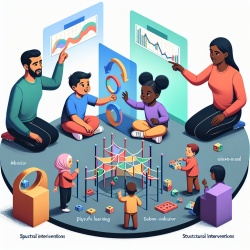Introduction
In the realm of pediatric care, understanding the intricate tapestry of cultural influences on health is paramount. The study "Sociocultural influences on newborn health in the first 6 weeks of life: qualitative study in a fishing village in Karachi, Pakistan" provides a compelling exploration of these dynamics. As practitioners, leveraging these insights can significantly enhance our ability to deliver culturally sensitive and effective care.
Key Findings
The research highlights several key sociocultural factors affecting newborn health:
- Multigenerational Care: Infant care is a collective family effort, often led by grandmothers, which can both support and limit maternal autonomy.
- Breastfeeding Practices: While breastfeeding is recognized for its health benefits, cultural practices often introduce supplementary feeding early, potentially impacting breastfeeding duration and infant health.
- Decision-Making Dynamics: Mothers often lack a voice in health decisions, which are typically made by senior family members, affecting timely healthcare access.
- Traditional vs. Medical Practices: There is tension between traditional remedies and modern medical practices, with families sometimes preferring the former due to cultural familiarity.
Implications for Practitioners
For practitioners, understanding these cultural nuances is crucial. Here are strategies to enhance your practice:
- Cultural Competency Training: Engage in training that deepens your understanding of the cultural contexts of the communities you serve. This knowledge can guide more effective communication and intervention strategies.
- Family-Centered Care: Develop interventions that involve the entire family, respecting their roles and decision-making processes. This approach can help bridge gaps between traditional practices and modern healthcare.
- Advocacy for Maternal Voice: Encourage and empower mothers to participate actively in health decisions. This can be facilitated through community workshops and support groups.
- Collaborative Interventions: Work with local cultural leaders and healthcare providers to create interventions that respect cultural practices while promoting evidence-based health strategies.
Encouraging Further Research
The study underscores the need for further research into how cultural practices impact health outcomes. Practitioners are encouraged to engage in or support research initiatives that explore these dynamics, contributing to a broader understanding and better health outcomes for newborns.
Conclusion
By integrating cultural understanding with evidence-based practices, practitioners can significantly enhance the health outcomes of newborns in culturally diverse settings. The insights from this study provide a foundation for developing interventions that are both culturally sensitive and effective.
To read the original research paper, please follow this link: Sociocultural influences on newborn health in the first 6 weeks of life: qualitative study in a fishing village in Karachi, Pakistan.










